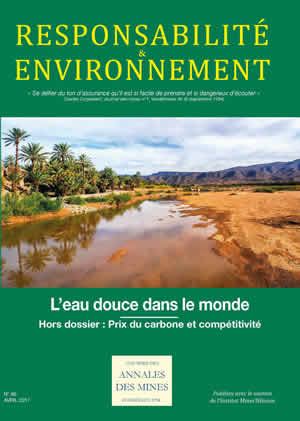 N° 86 - Avril 2017 - L'eau douce dans le monde, comment gérer un bien commun ? N° 86 - Avril 2017 - L'eau douce dans le monde, comment gérer un bien commun ?
Water Supply to Big Cities: Training and Development Initiatives Implemented by South Africa’s Largest Water Board: A Focus on the City of Johannesburg (Gauteng province, South Africa)
By Wayida MOHAMED, Maußeen MILES, Asief ALLI, Poppie SERA and Hendrik EWERTS
Rand Water, Johannesburg (South Africa)
People living in big cities around the world are supplied with potable water through sporadic water supply networks. In South Africa, water is generally supplied uninterruptedly. However, the efficacy of water supply to big cities such as the city of Johannesburg (CoJ) may be destructively impacted due to various challenges the county is currently facing. A major challenge faced by the South African water sector is a shortage of critical water-related skills. South Africa’s largest water board (SALWB) situated in the Gauteng province is implementing a number of training programmes to address the skills shortage challenges. Training and development (T&D) initiatives implemented by SALWB are aimed at capacitating the water sector to ensure sustainable water supply networks. Individuals obtaining qualifications through these T&D initiatives will focus on the full cycle of water supply (e.g. water conservation and water demand management, operation and maintenance of infrastructure as well as the quality of potable water). T&D initiatives discussed in this paper also focus on socio-economic benefits for the country and add meaningful value to the South African water sector.
 Télécharger gratuitement l'article Télécharger gratuitement l'article
 Retour au sommaire Retour au sommaire
 N° 86 - April 2017 - Fresh water: How to manage a common good? N° 86 - April 2017 - Fresh water: How to manage a common good?
Water Supply to Big Cities: Training and Development Initiatives Implemented by South Africa’s Largest Water Board: A Focus on the City of Johannesburg (Gauteng province, South Africa)
Wayida Mohamed, Maußeen Miles, Asief Alli, Poppie Sera and Hendrik Ewerts,
Rand Water, Johannesburg (South Africa)
People living in big cities around the world are supplied with potable water through sporadic water supply networks. In South Africa, water is generally supplied uninterruptedly. However, the efficacy of water supply to big cities such as the city of Johannesburg (CoJ) may be destructively impacted due to various challenges the county is currently facing. A major challenge faced by the South African water sector is a shortage of critical water-related skills. South Africa’s largest water board (SALWB) situated in the Gauteng province is implementing a number of training programmes to address the skills shortage challenges. Training and development (T&D) initiatives implemented by SALWB are aimed at capacitating the water sector to ensure sustainable water supply networks. Individuals obtaining qualifications through these T&D initiatives will focus on the full cycle of water supply (e.g. water conservation and water demand management, operation and maintenance of infrastructure as well as the quality of potable water). T&D initiatives discussed in this paper also focus on socio-economic benefits for the country and add meaningful value to the South African water sector.
 Retour au sommaire Retour au sommaire
 N° 86 - Abril 2017 - El agua dulce en el mundo, N° 86 - Abril 2017 - El agua dulce en el mundo,
¿Cómo gestionar un bien común?
Water Supply to Big Cities: Training and Development Initiatives Implemented by South Africa’s Largest Water Board: A Focus on the City of Johannesburg (Gauteng province, South Africa)
Wayida Mohamed, Maußeen Miles, Asief Alli, Poppie Sera and Hendrik Ewerts,
Rand Water, Johannesburg (South Africa)
People living in big cities around the world are supplied with potable water through sporadic water supply networks. In South Africa, water is generally supplied uninterruptedly. However, the efficacy of water supply to big cities such as the city of Johannesburg (CoJ) may be destructively impacted due to various challenges the county is currently facing. A major challenge faced by the South African water sector is a shortage of critical water-related skills. South Africa’s largest water board (SALWB) situated in the Gauteng province is implementing a number of training programmes to address the skills shortage challenges. Training and development (T&D) initiatives implemented by SALWB are aimed at capacitating the water sector to ensure sustainable water supply networks. Individuals obtaining qualifications through these T&D initiatives will focus on the full cycle of water supply (e.g. water conservation and water demand management, operation and maintenance of infrastructure as well as the quality of potable water). T&D initiatives discussed in this paper also focus on socio-economic benefits for the country and add meaningful value to the South African water sector.
 Retour au sommaire Retour au sommaire
|




